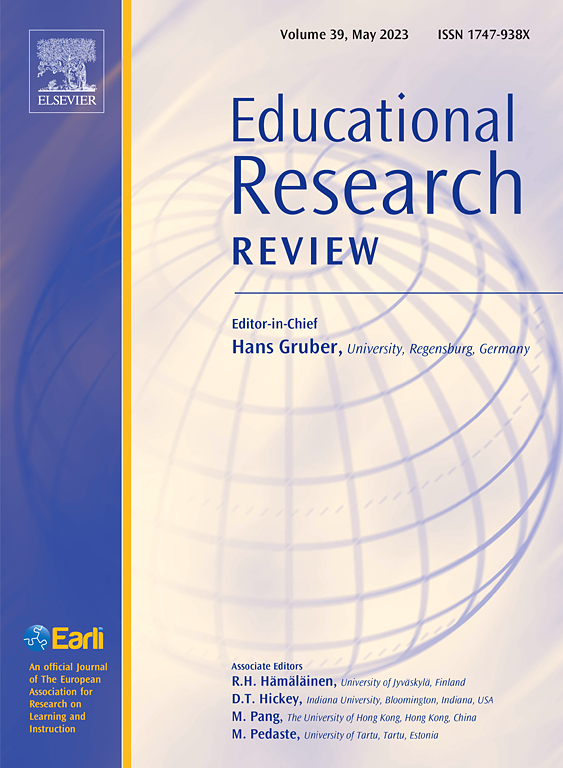Sense of belonging in undergraduate computing students: A scoping review
IF 10.6
1区 教育学
Q1 EDUCATION & EDUCATIONAL RESEARCH
引用次数: 0
Abstract
Sense of belonging in education encompasses an individual's experiences of feeling accepted, valued, and included within educational environments. Not all students experience the same level of sense of belonging, and those from marginalised or under-represented groups are shown to report lower levels of belonging compared to others in their cohorts. Fostering a stronger sense of belonging amongst these groups to address this unevenness is beneficial for retaining diversity and closing representation gaps, as students persist when they feel they belong. However, student belonging is complex and challenging to measure. For the development of meaningful interventions to level sense of belonging across various groups by improving belonging for those with lower belonging, there is a need for clarity on how 1) sense of belonging is theorised in research into undergraduate students, 2) how it is measured, and 3) how belonging has been operationalised to improve diversity and student retention. This review focuses specifically on computing, as a discipline with persistent representation gaps limiting its development, synthesising existing studies investigating sense of belonging among undergraduate computing students. The PRISMA extension for scoping reviews (PRISMA-Scr) was utilised to source and review 22 relevant peer-reviewed articles published between 2013 and 2022. The review shows that most existing research follows a quantitative study. The research reveals how multiple barriers to student belonging are experienced differently across different student populations. Belongingness has significant disparities relating to gender, race, and sexuality that may explain representation gaps, but attention needs to be paid to how these identities intersect to shape student experiences. The research also suggests various social and academic interventions that can raise sense of belonging. These findings provide valuable insights into undergraduate student belonging that may inform the development of targeted interventions aimed at retaining diverse student cohorts and closing representation gaps, as well as informing future research aimed at fostering and improving sense of belonging among undergraduate computing students.
计算机专业本科生的归属感:范围审查
教育中的归属感包括个人在教育环境中被接受、被重视和被包容的经历。并不是所有的学生都有同样程度的归属感,那些被边缘化或代表性不足的群体的学生的归属感比他们的同龄人要低。在这些群体中培养更强烈的归属感,以解决这种不平衡现象,有利于保持多样性,缩小代表性差距,因为学生们在有归属感的时候会坚持下去。然而,学生归属感的测量是复杂且具有挑战性的。为了开发有意义的干预措施,通过改善归属感较低的群体的归属感来提高不同群体的归属感,需要明确如何1)在本科生研究中建立归属感的理论,2)如何测量归属感,以及3)如何实施归属感以提高多样性和学生保留率。这篇综述特别关注计算机,作为一门学科,持续存在的代表性差距限制了它的发展,综合了现有的研究,调查了本科生计算机学生的归属感。PRISMA范围审查扩展(PRISMA- scr)用于检索和审查2013年至2022年间发表的22篇相关同行评议文章。这篇综述表明,大多数现有的研究都是基于定量研究。这项研究揭示了在不同的学生群体中,学生归属感的多重障碍是如何不同的。归属感在性别、种族和性别方面存在显著差异,这可能解释了代表性差距,但需要注意的是,这些身份是如何交叉的,从而塑造了学生的经历。该研究还提出了各种社会和学术干预措施,可以提高归属感。这些发现为本科生的归属感提供了有价值的见解,可以为有针对性的干预措施的发展提供信息,这些干预措施旨在保留不同的学生群体,缩小代表性差距,并为未来的研究提供信息,旨在培养和提高计算机专业本科生的归属感。
本文章由计算机程序翻译,如有差异,请以英文原文为准。
求助全文
约1分钟内获得全文
求助全文
来源期刊

Educational Research Review
EDUCATION & EDUCATIONAL RESEARCH-
CiteScore
19.40
自引率
0.90%
发文量
53
审稿时长
57 days
期刊介绍:
Educational Research Review is an international journal catering to researchers and diverse agencies keen on reviewing studies and theoretical papers in education at any level. The journal welcomes high-quality articles that address educational research problems through a review approach, encompassing thematic or methodological reviews and meta-analyses. With an inclusive scope, the journal does not limit itself to any specific age range and invites articles across various settings where learning and education take place, such as schools, corporate training, and both formal and informal educational environments.
 求助内容:
求助内容: 应助结果提醒方式:
应助结果提醒方式:


